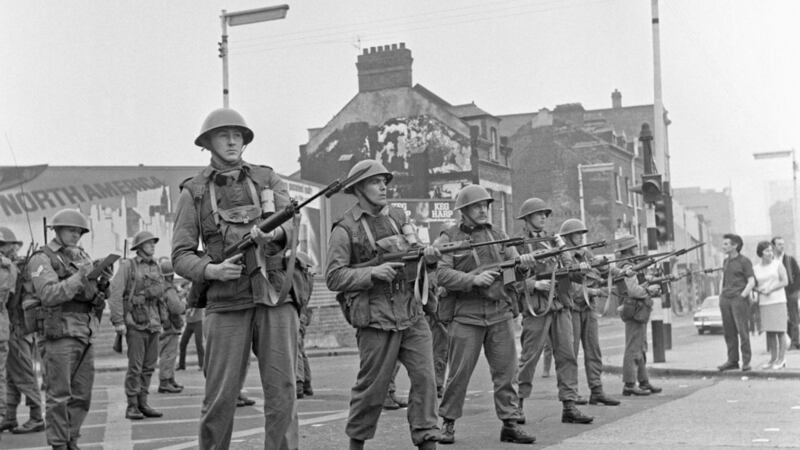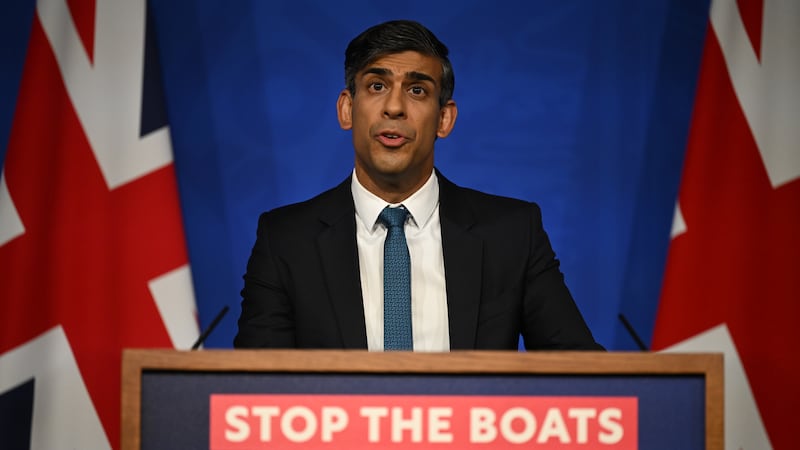No wonder that for some remembering this time around has gone too deep for tears and way too deep for words.
For others, there are easy words, hard and cruel words, the self-serving re-write. There will be more before it’s over. A fiftieth anniversary is not nothing. A reminder that many of us will not see the next one was the tucked-away observation that as Belfast’s Catholics fled their blazing homes some among them remembered the Twenties.
There is room, always, for wondering at how little some have learned. As there is need, and even duty, to think hard about the memories hauled out at the least excuse for another airing. Though they may have been polished up in the meantime, revved up to appeal to shout-radio.
Seeing police charge down your street alongside loyalists intent on arson did bad things to a lot of minds. It left Catholic parents without answers for angry teenagers, or themselves. It also left many Protestants elsewhere disbelieving.
The hardest reality to transmit across the ‘communal divide’ was submerged by everyday life until then for some, even most. It was the fear northern Catholics always had that the north’s forces of law and order would turn on them, leaving them defenceless. Many Protestants could not or would not believe that. Not then, not now. It had to be lies, propaganda, a Catholic ‘excuse’ for a controlling, manipulating IRA that some Protestants preferred to believe then and still much prefer now - over the reality of a very few with old guns who were only transformed by 1969 and its aftermath into the Provisional IRA.
For a short time away back then, many in the south got it. Historian Brian Hanley has done lovely work on reports and comments, then and later, on the flight of northerners across the border from 1969-75. A chapter in his ‘Boiling Volcano’ takes its title from a typical 1974 Conor Cruise O’Brien dark prophecy, on what some of the refugees could mean for the south; ‘Tough, Violent and Virtually Ungovernable’. Hanley also found warm, even loving support, people from the deepest south taking miserable, terrified northerners, mostly from Belfast, into their homes. He used so many records from the time, radio and television as well as print, that the effect is documentary. ‘On arrival the Northerns cried with joy and relief ...Before long they had been taken into Mullingar hearts and homes’; the Westmeath Examiner, September 1969.
Early sentiment gave way to swift disillusionment, both mutual. Hanley noted the terror of the fleeing, ‘mostly urban working-class’ unlike much of the ‘officialdom dealing with them’.
A Micheál McGreil 1972-73 study found 55 per cent Dublin respondents agreed that ‘Northerners on all sides tend to be extreme and unreasonable.’ Amid fears of violence spilling across the border, he concludes, the south increasingly saw all the north as complicit in conflict in some way. This ‘only intensified misunderstandings and prejudices which had existed for decades.’
After years with little or no aggro at the height of the marching season, this has been a bad enough summer. Bonfires taking the place of contested marches and flags; hatred blazing out of burning flags and effigies and ugly slogans, abusive of the dead and cruel beyond imagination to their families; all of this is bad enough.
What is worse is that political figures in cold blood ramp up hate and hurt with their own mechanical formulas; the DUP leaping on the Soldier F/Apprentice Boys while the Apprentice Boys themselves tried for calm, Sinn Féin’s Martina Anderson chanting ‘Tiocfaidh ár lá’ at a Hunger Strike memorial. Without the Anderson contribution, in contrast to cool Gerry Kelly and Gerry Adams as wise tribal elders in the New Lodge, Sinn Féin could have rightfully looked across in scorn at Arlene Foster and Sammy Wilson.
Memory is tricky. Its political expression needs management and compassion, or just a titter of wit.








